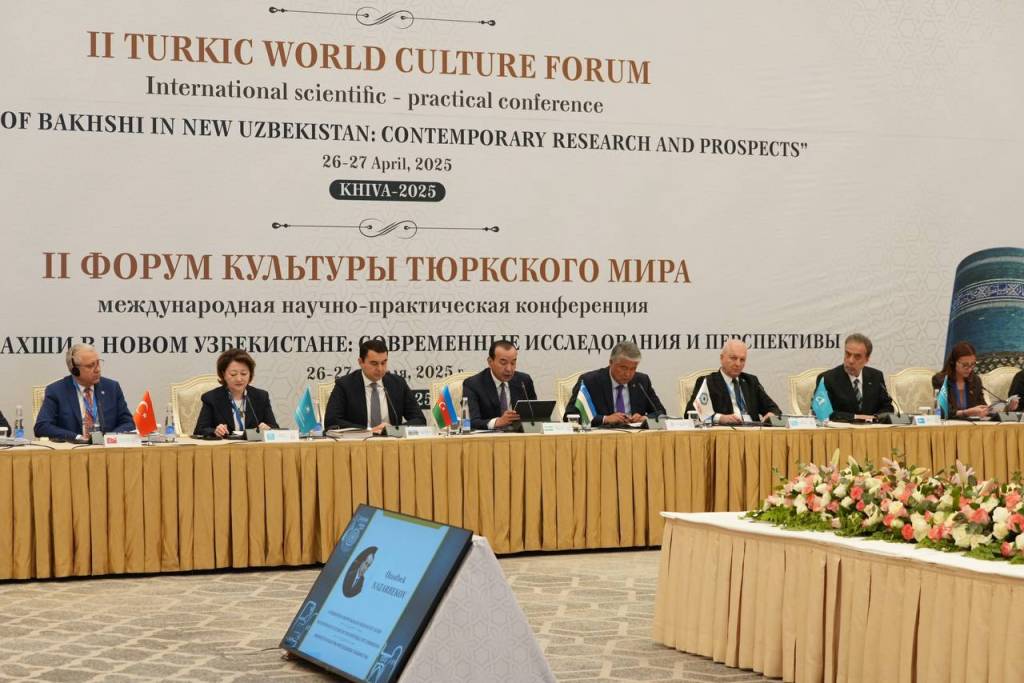WNAM MONITORING: As previously reported, the ancient city of Khiva, recognized by UNESCO as a World Heritage Site, hosted the 2nd Turkic World Culture Forum as part of the 4th International Bakhshi Art Festival.
During the forum, an international scientific and practical conference was held, dedicated to preserving and developing oral folk art. The conference brought together prominent government and academic figures from Turkic-speaking countries. Among the distinguished guests were Adil Karimli, Minister of Culture of the Republic of Azerbaijan, Sultan Raev, Secretary General of TURKSOY, Aktoty Raimkulova, President of the Turkic Culture and Heritage Foundation, Shahin Mustafayev, President of the Turkic Academy, Mehmet Süreyya Er, Secretary General of the Parliamentary Assembly of Turkic States (TURKPA), Gulbara Abdykalykova, Deputy Minister of Culture, Information, Sports, and Youth Policy of the Kyrgyz Republic, and other high-ranking officials.
Leading folklorists from Russia, Türkiye, Azerbaijan, Kyrgyzstan, and Kazakhstan represented the scientific part of the conference. Among them were internationally recognized scholars such as Karl Reichel, Fikret Türkmen, Eunkyeong Oh, Oğuz Mehmet Oçal, Metin Ekici, Anarboy Buldiboy, Gulnor Khusainova, and others. Their presentations focused on the history and significance of the art of Bakhshi within the context of world culture, the preservation of intangible heritage, and modern approaches to the study of oral traditions.
Folklorists from Uzbekistan, representing the country’s academic and educational institutions, also actively participated in the conference, presenting scholarly articles highlighting current issues and prospects for the development of Bakhshi art.
In his opening remarks, Minister of Culture of the Republic of Uzbekistan Ozodbek Nazarbekov emphasized the symbolic significance of hosting such a prestigious forum in Khiva.
“Khiva is a pearl of historical heritage and a spiritual center that has played a key role in developing science, culture, and art since ancient times. Hosting the festival in this city highlights the continuity of our cultural traditions and the importance of preserving them for future generations. Khiva was named the Cultural Capital of the Turkic World in 2020 and the Capital of Islamic Tourism in 2024, reflecting its international recognition and cultural significance”, the Minister stated.
The Minister also emphasized that major conferences organized in recent years in brotherly countries and the proposals and initiatives put forward at these events contribute to strengthening spiritual unity, preserving shared values, and bringing peoples closer together. In particular, the 1st Forum of Turkic World Culture, held in Shusha – the pearl of Azerbaijan and one of the cultural capitals of the Turkic world – marked an important milestone in deepening friendly relations and elevating cooperation to a new level.
“Uzbekistan actively participates in events and projects within the framework of cooperation among Turkic-speaking states. In Uzbekistan, cultural and art days, youth and theater festivals, and creative forums are held in a coordinated manner. Our scholars and cultural figures actively participate in international conferences dedicated to developing Turkic languages and literature”, said Mr. Nazarbekov.
Among the practical outcomes of such cooperation, the Minister highlighted the publication in Uzbek of a 100-volume series titled “Masterpieces of Turkic Literature”, which includes works by more than 450 classical and contemporary authors from Uzbekistan, Türkiye, Kazakhstan, Kyrgyzstan, Azerbaijan, Turkmenistan, and Hungary.
Secretary General of the International Organization of Turkic Culture (TURKSOY) Sultan Raev also spoke at the international conference, emphasizing the special role of Uzbekistan in developing Turkic civilization.
“For more than 30 years, at TURKSOY, we have regarded it as our foremost duty to preserve the common identity of the Turkic world through art, language, literature, and music. This forum is not merely a meeting of cultures for us. It symbolizes the formation of a new concept of civilization, based on shared values and common goals for the future. As the land of great thinkers, poets, and philosophers, Uzbekistan has historically been at the heart of Turkic-Muslim civilization. Great scholars – Alisher Navoi to Imam Maturidi, Bahauddin Naqshband to Abu Rayhan Beruni – have shown us the path of sound reasoning and high morality. It is a great honor and immense pleasure for me to be here with you at such a significant conference in Uzbekistan – the cradle of science, culture, and ancient wisdom of the Turkic world”, Mr. Raev said.
“Our cultural heritage is not merely a memory of the past, but a light that illuminates the path to the future. It inspires us, strengthens our identity, and becomes the spiritual core that unites the Turkic world. Today, we fully embrace the mission to preserve and enrich these treasures”, Aktoty Raimkulova, President of the Turkic Culture and Heritage Foundation, noted, speaking at the conference in Khiva.
She emphasized that the Foundation builds its work based on the strategic documents “Vision of the Turkic World – 2040” and “Turk Time” and is guided by the directives of the heads of the Turkic states.
“We are implementing several projects aimed at protecting the rich culture and heritage of the Turkic peoples. An Association of Restorers, Historians, and Architects of the Turkic World has been established. Conferences dedicated to preserving cultural heritage have been held”, Ms. Raimkulova said.
According to her, a significant milestone was the implementation of the “Caravan of the Turkic World” initiative across the historical lands of Kazakhstan. Furthermore, as part of the Astana Declaration, the restoration of the Avvakul House-Museum was completed, laying the foundation for new directions in the field of monument preservation.
“The Foundation is also carrying out several important projects related to Uzbekistan. In 2024, we launched cooperation with scholars from the Turkic world, including Uzbekistan, to create a multilingual catalog and digital platform ‘Turkic Heritage’. This project will provide the broader public access to our region’s vast cultural resources”, Ms. Raimkulova said.


